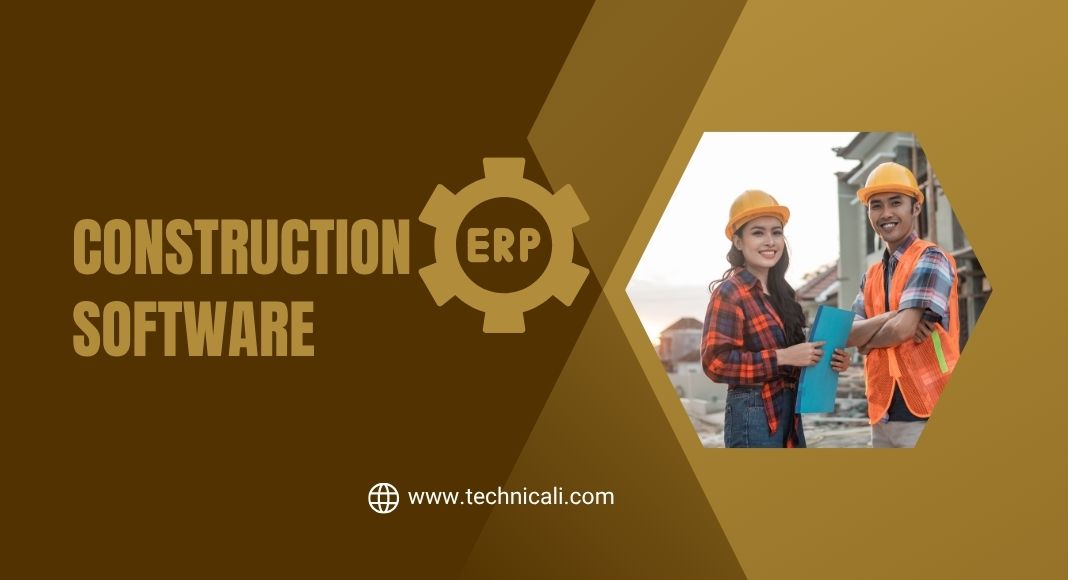Construction ERP Software offers a dynamic pathway to streamline multiple processes at once. Organisations in the construction industry often find themselves juggling resource management across numerous sites, wrestling with complicated compliance protocols, and grappling with intense project schedules. By implementing an ERP system that suits the requirements of construction experts, it is possible to successfully coordinate accounting, procurement, and project management all within a single ERP. The worldwide ERP software market continues to grow, according to a recent report, reflecting increasing demand for all-encompassing solutions integrating data management with stringent construction management. In this article, we will explore how to select the right solution while unveiling the top seven ERPs for construction.
Contents
- 1 What is Construction ERP Software?
- 2 How to Choose the Right Construction ERP Software
- 3 Top 7 Construction ERP Software Solutions
- 3.1 1. Procore – Best for Large Construction Firms
- 3.2 2. CMiC – Best for Accounting and Financial Management
- 3.3 3. Jonas Construction Software – Best for Small and Mid-Sized Construction Businesses
- 3.4 4. Viewpoint Vista – Best for Customisation and Flexibility
- 3.5 5. Sage 300 Construction and Real Estate – Best for Real Estate Developers
- 3.6 6. Foundation Software – Best for Contractors and Builders
- 3.7 7. COINS Global – Best for Large-Scale Enterprise Construction
- 4 Benefits of Using ERP in the Construction Industry
- 5 Common Challenges and Solutions in Implementing Construction ERP
- 6 Future of ERP in the Construction Industry
- 7 Conclusion
What is Construction ERP Software?
Construction ERP software differs from conventional enterprise resource planning system options because it focuses on the unique demands of a large construction environment. Whereas a general solution may struggle to address the specialized requirements of construction sector tasks, an ERP for the construction industry is designed to tackle project management and accounting, cloud-based ERP capabilities, and resource management tailored to building and engineering firms. It enables real-time project oversight, cost control, and the centralized document management of inventories, assets, and schedules.
Key benefits of such modern ERP systems include:
- Real-time project tracking that aids in risk management
- Automated accounting and cost oversight
- Seamless integration with procurement and inventory management
- Cloud-based and mobile accessibility for field management
- Regulatory compliance with complex codes
With the integration of construction software specifically developed for the construction sector, business firms are able to make deeper inferences from budget management and schedule synchronisation. Not only does this structured model make routine functions smoother, but it also offers construction businesses that desire overall better performance with an ERP system.
How to Choose the Right Construction ERP Software

Choosing an ERP software might seem intimidating, especially for a construction company handling multiple construction projects. Before making a decision, consider these important factors:
Project size and complexity: A small contractor might prioritize simplicity, whereas a large company may require more advanced ERP software solutions that handle enterprise-scale demands.
Customisation and integration: If your software needs revolve around project management capabilities, accounting, and customer relationship management, ensure the ERP-designed solution you choose supports integration with existing software systems.
Cost vs. ROI: Implementation expenses can escalate, but they can be outweighed by improvements in resource allocation, cost control, and data management.
Scalability and cloud-based vs. on-premise: A flexible ERP solution matters because construction management evolves rapidly, and cloud ERP often appeals to teams requiring immediate updates from job sites.
Common objections: High upfront cost, fear of workflow disruption, and limited employee buy-in can hamper new software adoption.
Overcoming these hurdles may demand a carefully phased ERP project approach. By understanding the requirements of construction, organisations can mitigate friction and make the most of their management software.
Top 7 Construction ERP Software Solutions
1. Procore – Best for Large Construction Firms
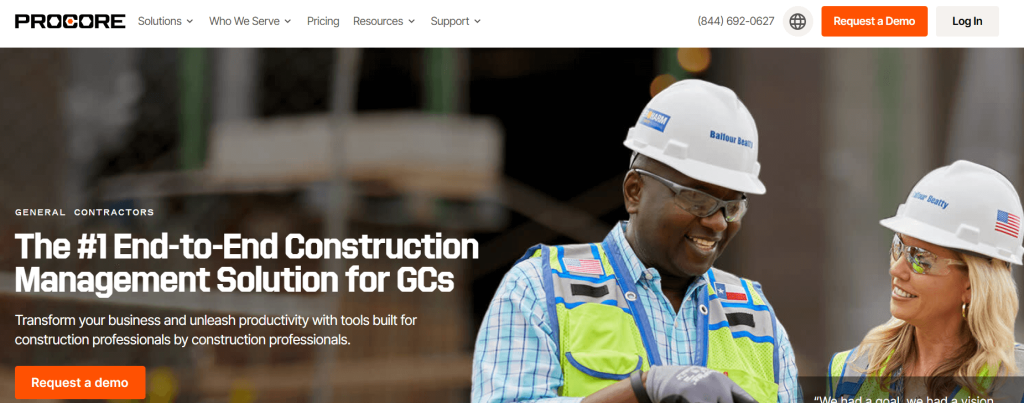
Procore has built a reputation for bringing together several aspects of construction management. From scheduling to field management, it serves big construction operations and assists construction companies in managing complexity.
Key Features
- Cloud-based dashboards that simplify top construction oversight
- Comprehensive project management for controlling schedules and tasks
- Integration with various accounting platforms
- Real-time collaboration tools that handle documents
- Mobile functionality for workers on-site
Assets
- Broad customizability
- Strong reporting modules
- Scalable for expanding construction companies
- Useful for managing construction data across multiple sites
- Ongoing support for ERP users
Liabilities
- Steep learning curve
- Higher cost for enterprise resource planning expansions
- Potential overkill for a smaller contractor
- It may require added training
- Integration complexities of software for your business are outdated
Best For
- Large-scale organisations need an ERP system that covers everything from risk management to extensive project oversight.
2. CMiC – Best for Accounting and Financial Management
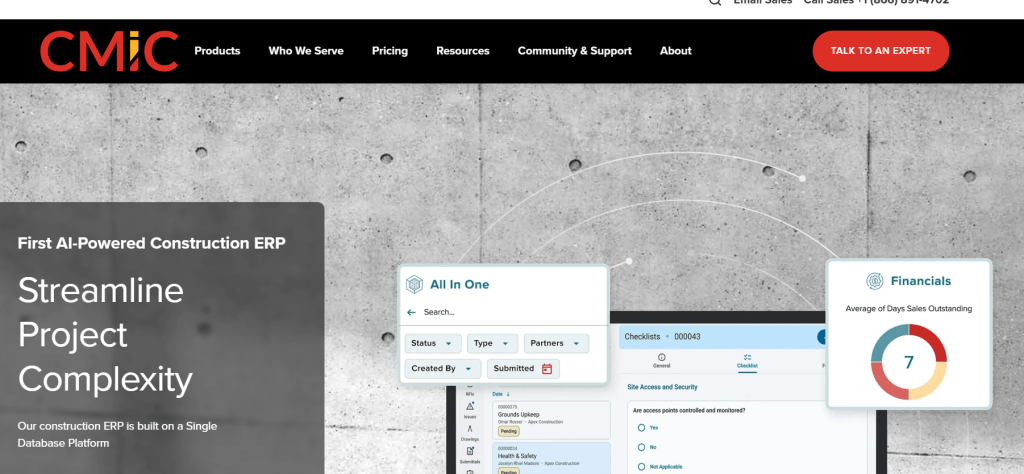
CMiC’s ERP is famous for its concentration on construction accounting. It offers construction with a specialized method for controlling funds, including automatic cost calculations and cost control.
Key Features
- Consolidated accounting and project management
- Order management modules that reduce miscommunication
- Built-in integration with other software solutions
- Cloud-based ERP platforms for remote access
- Detailed reporting of financial management
Assets
- Ideal for specialized financial management solution strategies
- Reduces manual errors in accounts payable
- Targets the specific needs of construction companies
- Solid procurement workflows
- Helps construction firms handle large budgets
Liabilities
- The interface can seem dated
- The implementation timeframe might be lengthy
- Not the best option for extremely large construction expansions
- Pricing might be high
- Requires thorough training for full adoption
Best For
- Companies that prioritize accounting and cost tracking, along with project synergy.
3. Jonas Construction Software – Best for Small and Mid-Sized Construction Businesses
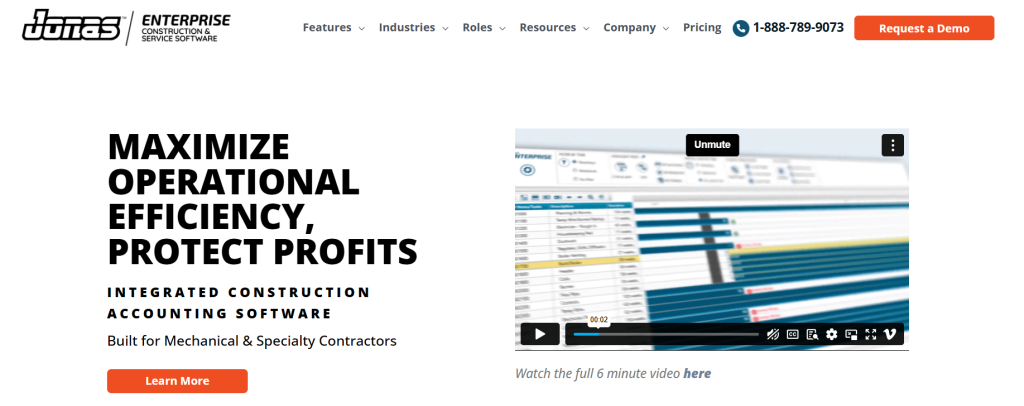
Jonas ERP was created for small and medium-sized construction company operations. Jonas ERP assists with bringing day-to-day activities into harmony and helps streamline processes.
Key Features
- Construction accounting software for consistent bookkeeping
- Built-in scheduling for contractors
- Integrations with payroll systems
- Mobile support for field teams
- Basic resource management for varied tasks
Assets
- Straightforward interface
- Good customer support
- Cloud-based options available
- Flexible pricing tiers
- Focused on the management of general contractors
Liabilities
- Limited advanced features for enterprise resource planning expansions
- Not always suitable for a large construction setup
- Customisation might require additional support
- Some limitations in data analytics
- Less known than other major platforms
Best For
- Smaller construction businesses looking for a balanced approach to project and financial tasks.
4. Viewpoint Vista – Best for Customisation and Flexibility
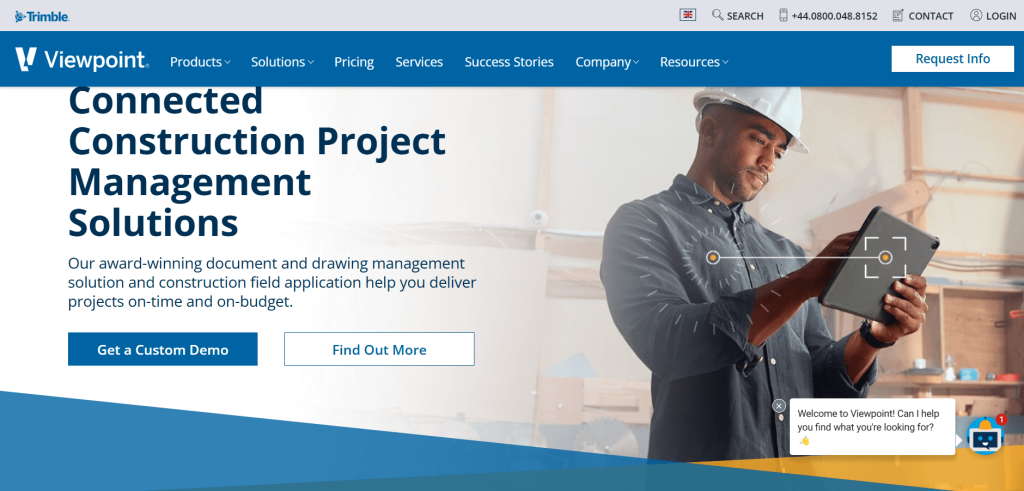
Viewpoint Vista offers construction management software solutions that are capable of fitting into a wide range of workflows. It is a construction ERP system that can manage anything from scheduling to construction accounting.
Key Features
- Cloud-based architecture that allows real-time updates
- Integration with existing software systems
- Comprehensive inventory management
- Advanced reporting for cost analysis
- Field modules for general contractor processes
Assets
- Highly customizable interface
- Suited for complex project management
- Encourages robust construction practices via analytics
- Flexible enough for different construction sector needs
- Centralized document management for audits
Liabilities
- Potentially overwhelming for small teams
- Implementation can be time-consuming
- Support might require additional cost
- It is not always the best ERP for construction companies with minimal resources
- Updates can introduce minor system lags
Best For
- A construction enterprise seeking a deeply customizable ERP solution that aligns with intricate workflows.
5. Sage 300 Construction and Real Estate – Best for Real Estate Developers
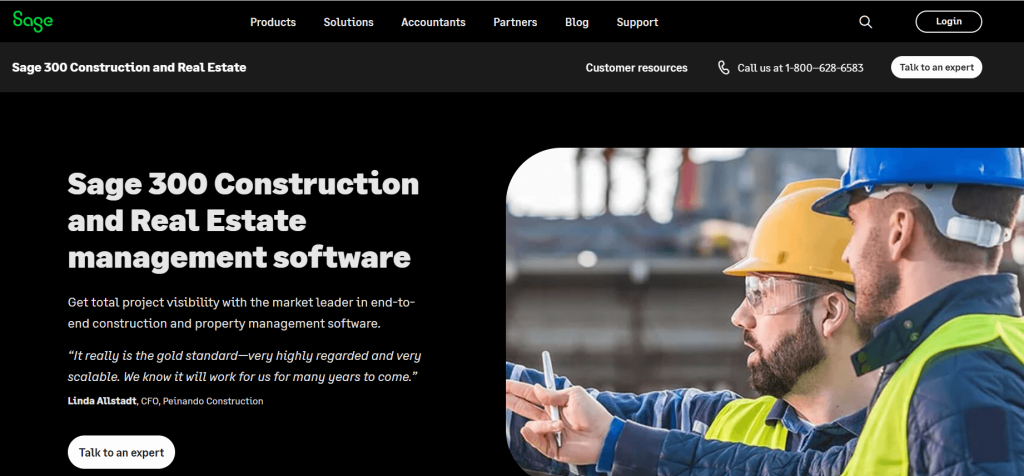
Sage 300 offers specialized modules for those in the construction industry and real estate. Many see this as the best construction approach to bridging building tasks and real estate deals.
Key Features
- Financial modules that simplify accounting and project management
- Cloud-based dashboards for quick oversight
- Tools for real estate transactions
- Analytical modules for cost forecasting
- Collaboration features for multiple stakeholders
Assets
- Stable track record
- Good blend of project oversight and property management
- Ties in with ERP capabilities for expansions
- Provides construction professionals with strong cost analysis
- Scalable for best ERP for construction companies that are growing
Liabilities
- Complex for novices
- This may necessitate advanced training
- Implementation fees add up
- Not ideal for micro-scale builder teams
- Requires consistent updates
Best For
- Construction business owners who handle real estate elements alongside building projects.
6. Foundation Software – Best for Contractors and Builders
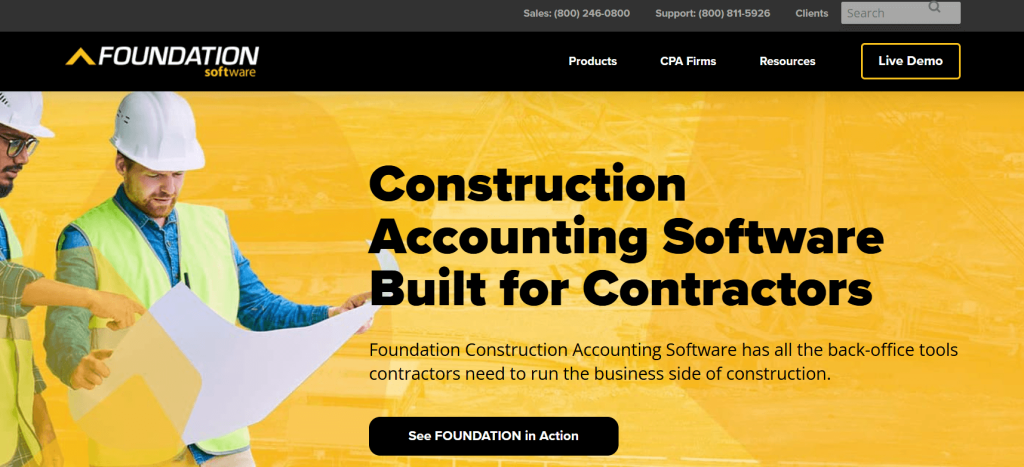
Foundation software supports general contractor workflows that integrate cost tracking, timesheets, and job costing. It is distinguished by its innovative integrated financial approach.
Key Features
- Includes construction accounting functionalities
- Streamlined cost reports
- Drill-down project tracking for multiple job sites
- Integration with payroll systems
- Automated alerts for deadlines
Assets
- Known for specialized support in the construction industry
- Clear user interface
- Offers real-time cost insights
- Minimizes manual data entry
- Encourages project timeline clarity
Liabilities
- Limited advanced analytics
- Cloud-based features might cost extra
- Not the best ERP for massive enterprise resource planning setups
- Smaller third-party integration library
- Mobile functionality may be basic
Best For
- Contractors or builder teams who need straightforward construction ERP system capabilities without excessive frills.
7. COINS Global – Best for Large-Scale Enterprise Construction
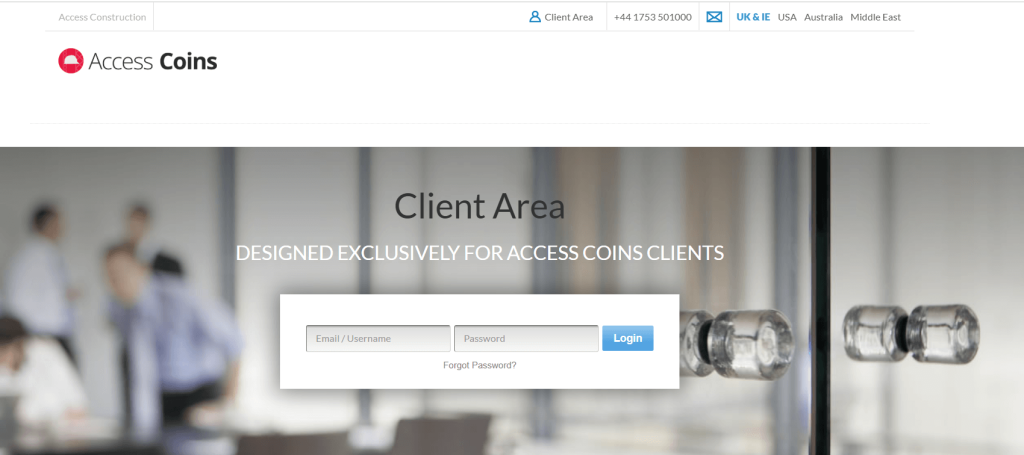
COINS Global is a single ERP that addresses wide areas of construction enterprise requirements, ranging from cost control to more profound forecasting. Most large organisations appreciate its one-stop approach.
Key Features
- Solutions for large-scale order management
- Real-time resource allocation tracking
- Advanced field management modules
- Cloud-based ERP features for distributed teams
- Analytics that covers risk management in complex builds
Assets
- Comprehensive coverage of essential construction software tasks
- Potential synergy between different departments
- Strong for project management
- Allows extended expansions like modern ERP integrations
- Good for data-driven decision-making
Liabilities
- High initial implementation cost
- The steep learning curve for new employees
- May require external consultants for setup
- Not always easy to pivot mid-project
- It might be overpowered for mid-sized companies
Best For
- Organisations involved in large construction projects that require advanced ERP solution capabilities.
Benefits of Using ERP in the Construction Industry
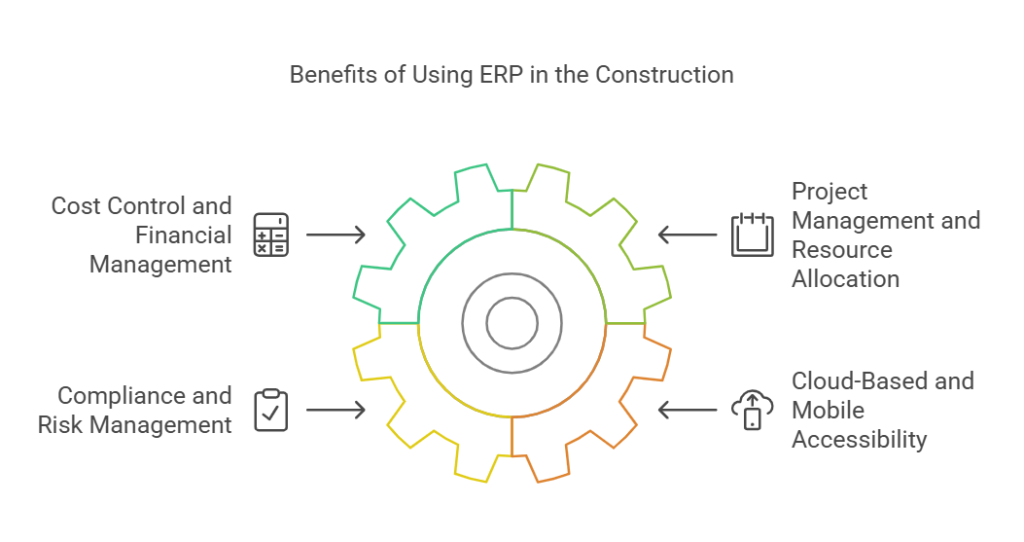
1. Cost Control and Financial Management
Effective control over project budgets is a fundamental goal in any construction company. Through repetitive accounting automation, such platforms avoid errors and provide users with real-time information on spending. They also assist with managing financial management functions such as payroll and accounts payable, providing improved profitability.
2. Project Management and Resource Allocation
Project management and accounting functionality assist in integrating scheduling with on-site work. Construction ERP enables improved organisation of labor resources, assists construction in minimizing downtime, and provides for materials arrive at the right time. This integration expedites project timelines and simplifies overall processes.
3. Compliance and Risk Management
Managing construction can be fraught with regulatory compliance pitfalls, and an ERP system can maintain relevant documentation while meeting the needs of construction guidelines. Through consistent oversight, you reduce risk exposure and guarantee every project meets specified standards.
4. Cloud-Based and Mobile Accessibility
Construction ERP solution implementations that integrate cloud-based capabilities enable collaboration anywhere. Through the use of a mobile interface, project managers are able to track job sites and post updates in real-time, ensuring that all departments stay aligned even across physical distances.
Common Challenges and Solutions in Implementing Construction ERP
High implementation costs prompt some construction companies to hesitate. However, the returns in controlling cost overruns and organizing procurement processes can outweigh the initial expense. Employee resistance surfaces, too, but well-structured training programs and demonstrations of how ERP systems provide benefits can tip the balance. If integration issues arise, an ERP helps unify software needs by offering open APIs for third-party tools.
Future of ERP in the Construction Industry
As technology evolves, the ERP for the construction industry continues to incorporate cutting-edge developments. AI can dissect data sets for better forecasting, IoT sensors feed real-time construction metrics, and blockchain can secure transactions. Over time, we will see an even tighter convergence of project management, cost analytics, and data automation.
Conclusion

Selecting the ideal ERP for construction businesses involves an in-depth examination of project size, integration needs, and future objectives. Regardless of whether you manage a huge construction business or have a smaller construction company, the best ERP software will be the core of your entire operation. By adopting a secure system and leveraging enterprise resource planning benefits, your business can reduce tasks, improve project management, and drive growth within a competitive construction market. Such software for the construction industry not only revolutionizes day-to-day operations but also secures cost controls, closing the gap between accounting and project timelines.

